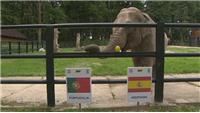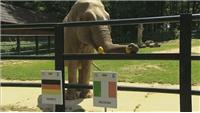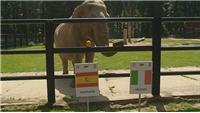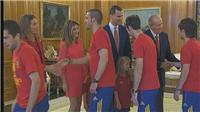
UEFA Euro 1980
 Host country and Venues
Host country and Venues
Host country: Italy
Venues:
1. Rome: Stadio Olimpico
2. Milan: Giuseppe Meazza
3. Naples: Stadio San Paolo
4. Turin: Stadio Comunale
History
Only in the side because of Klaus Fischer's broken leg, Horst Hrubesch stole the spotlight in the 1980 UEFA European Championship final with both of West Germany's goals against Belgium.

West Germany celebrate with the trophy after beating Belgium
The success of the 1976 UEFA European Championship fed the clamour for more places at the final tournament, and UEFA responded by doubling the number of participants as the competition returned to Italy for a second time.
With eight teams now involved instead of four, the hopefuls were divided into two groups, from which the winners were to advance directly to the final. In another change to procedure, one of those eight places went automatically to Vincenzo Bearzot's hosts, but without suspended striker Paolo Rossi they faced an uphill struggle in a section also featuring England, Belgium and Spain. If little was expected of Spain, England had stormed through qualifying and possessed a world-class striker in 1978 and 1979 European Footballer of the Year, Kevin Keegan. The Hamburger SV ace was unable to find the target, however, and after opening with a 1-1 draw against Belgium, England’s ambitions evaporated with a 1-0 loss to Italy. Italy had kicked off with a goalless draw against Spain, and they too crashed out after being held to the same scoreline by Belgium, who were suddenly through to their first major final thanks to a fine squad and excellent coaching from Guy Thys.
In the other half of the draw, West Germany had voyaged south with a revitalised team driven by Karl-Heinz Rummenigge and 20-year-old Bernd Schuster. A playmaker in the Günter Netzer mould, Schuster had few equals in world football at the time. "I don't think I have ever seen such a perfect player," enthused team-mate Horst Hrubesch. "Bernd was the outstanding player in the team. He connected the whole thing."
The Germans began by gaining revenge on Czechoslovakia, who had beaten them in the 1976 final, and made sure of a berth in the final with an equally satisfying 3-2 success against rivals the Netherlands. Two late Dutch goals almost cancelled out a hat-trick from Klaus Allofs, but Jupp Derwall's side held on before completing the group phase by drawing 0-0 with Greece.
With no semi-finals under the new format, the next match brought together Italy and the Czechs to decide third place. It was the holders who prevailed, reasserting their penalty shoot-out prowess after a disappointing contest ended 1-1. That proved to be the last time the third-place play-off was ever held.
Fortunately, the final itself provided more entertainment despite the much-fancied Germans taking an early lead when Hrubesch fired home after ten minutes. Second-half pressure resulted in a penalty for Belgium, which René Vandereycken dispatched, but just as in 1976 Germany scored late on – and this time it was the winner. Hrubesch, who was only in the side because of Klaus Fischer’s broken leg, was the hero again as he headed in Rummenigge’s corner to reclaim the European crown.
Horst Hrubesch's final double helped make amends for his European Cup upset with Hamburger SV in the year the Republic of Ireland won Eurovision and Pac-Man was born.

Nottingham Forest celebrate retaining the European Champion Clubs' Cup in 1980
After losing the 1976 final to Czechoslovakia on penalties, West Germany were determined to put things right in Italy. A side boasting soon-to-be-crowned European Footballer of the Year Karl-Heinz Rummenigge, Karlheinz Föster and Hansi Müller avenged that defeat in the group stage. Among the contenders – whose number had risen from four to eight teams – were 1974 and 1978 FIFA World Cup finalists the Netherlands, England and a solid Italy side hoping to win on home soil for the second time in 12 years. But this was to be West Germany's – and Horst Hrubesch's – tournament.
Winners: West Germany
Runners-up: Belgium
Third: Czechoslovakia
Fourth: Italy
Group stage: Netherlands, Greece, Spain, England
Top scorers: Klaus Allofs (West Germany) – 3
Did you know?
Italy were the first country to host the competition twice, having also staged – and won – the 1968 finals.
Hot News
- Funny Balotelli!
- Spanish fans celebrate Euro Cup win
- That's German WAGS!
- The sexy female fans in Euro 2012
- Euro 2012: Spain fans celebrate victory
- Spain vs Italy in clash of the Euro WAGs
- Euro 2012 Final - Spain 4 : 0 Italy, Part 2
- Germany knocked out by Italy
- Natalia Siwiec blasts Sol and the BBC
- Coleen Rooney reveals her bikini body secrets
- Italy's fans celebrated wildly
- Euro 2012 Final - Spain 4 : 0 Italy, Part 1
| Rank | Team | W/D/L | Pts |
|---|
Cities & Stadiums
The Top 3 Teams of Previous Tournaments
| Year | Winners | Runner-up | Third place |
|---|---|---|---|
| 2008 | Spain | Germany | Russia / Turkey |
| 2004 | Greece | Portugal | Netherlands / Czech Republic |
| 2000 | France | Italy | Netherlands / Portugal |
| 1996 | Germany | Czech Republic | France / England |
| 1992 | Denmark | Germany | Netherlands / Sweden |
| 1988 | Netherlands | Soviet Union | Italy / West Germany |
| 1984 | France | Spain | Denmark / Portugal |
| 1980 | West Germany | Belgium | Czechoslovakia |
| 1976 | Czechoslovakia | West Germany | Netherlands |
| 1972 | West Germany | Soviet Union | Belgium |
| 1968 | Italy | Yugoslavia | England |
| 1964 | Spain | Soviet Union | Hungary |
| 1960 | Soviet Union | Yugoslavia | Czechoslovakia |



